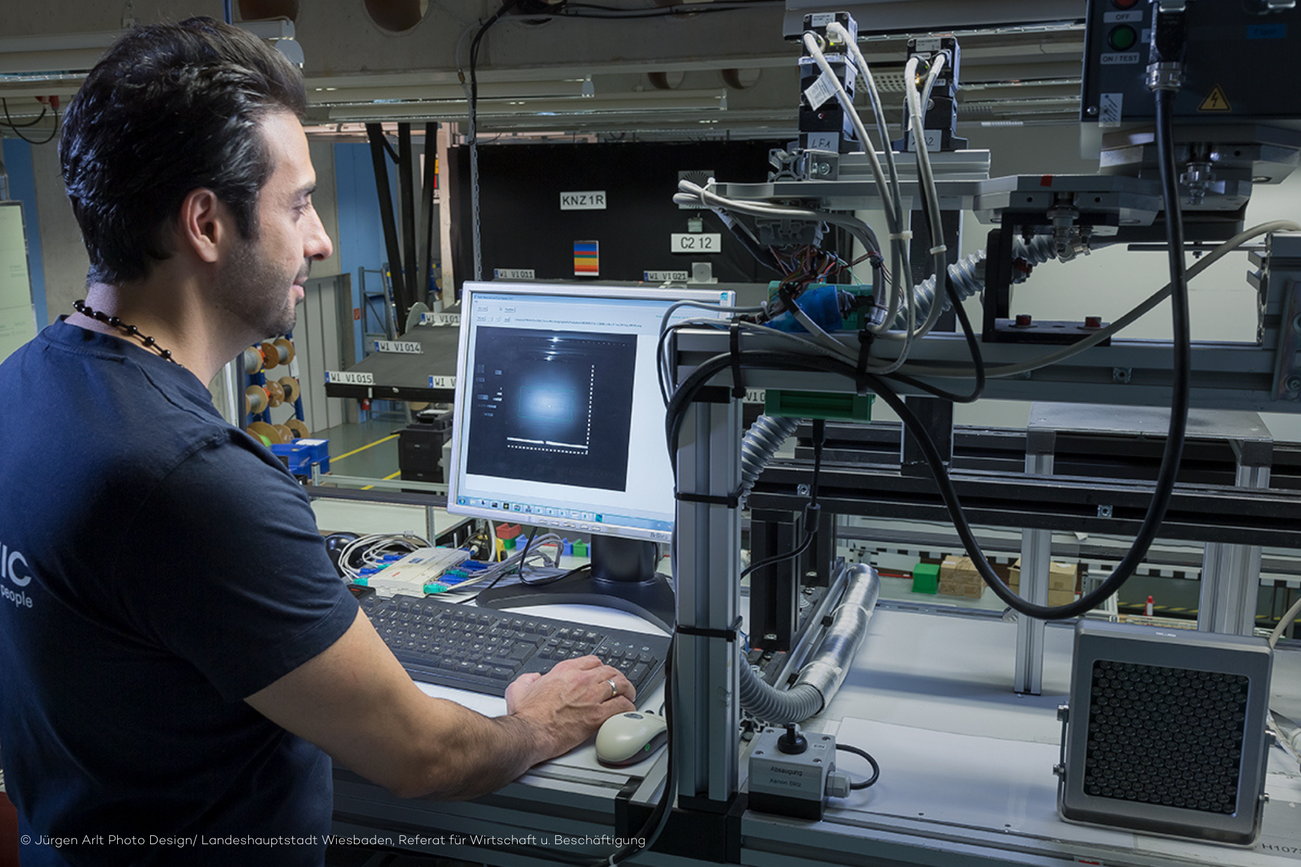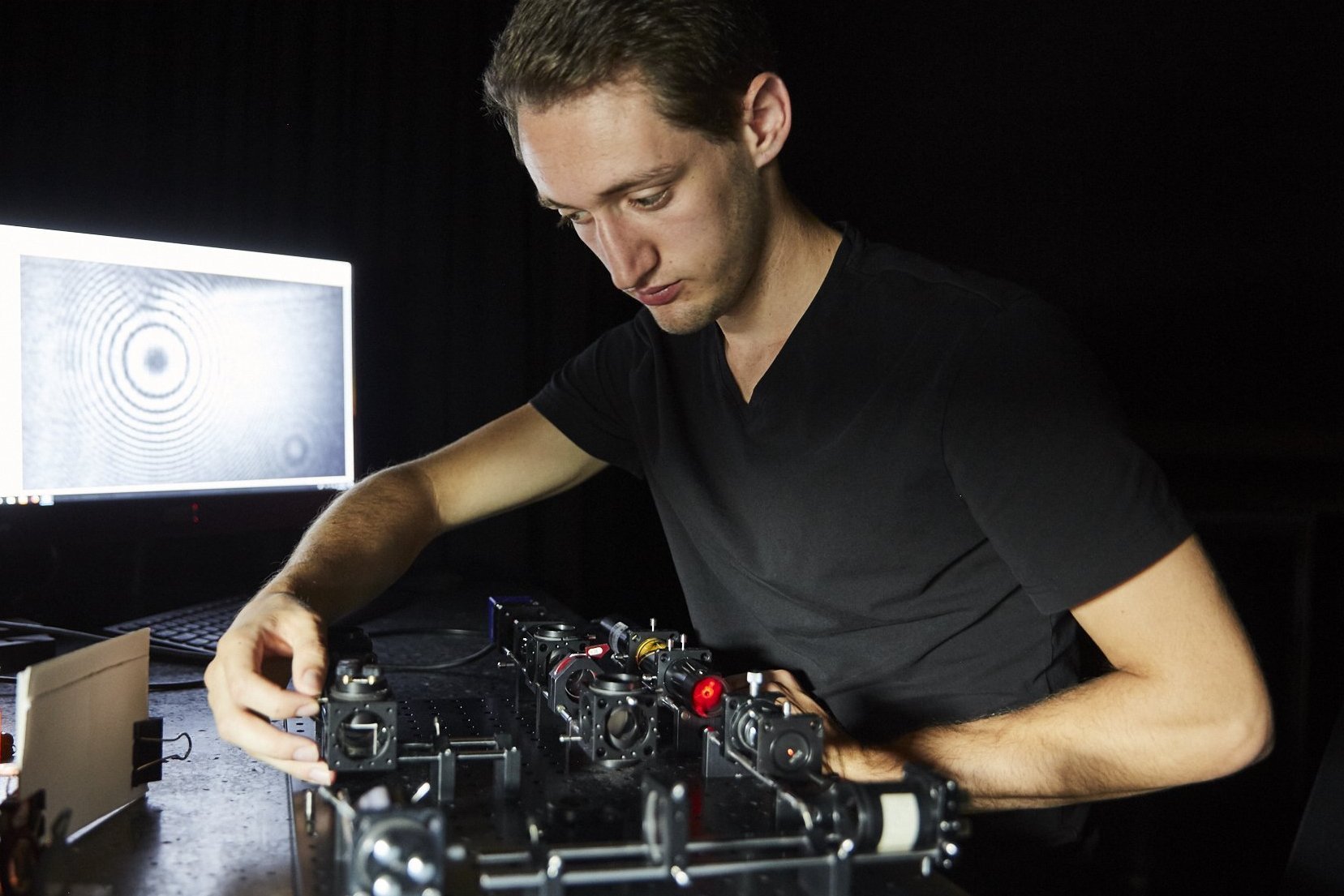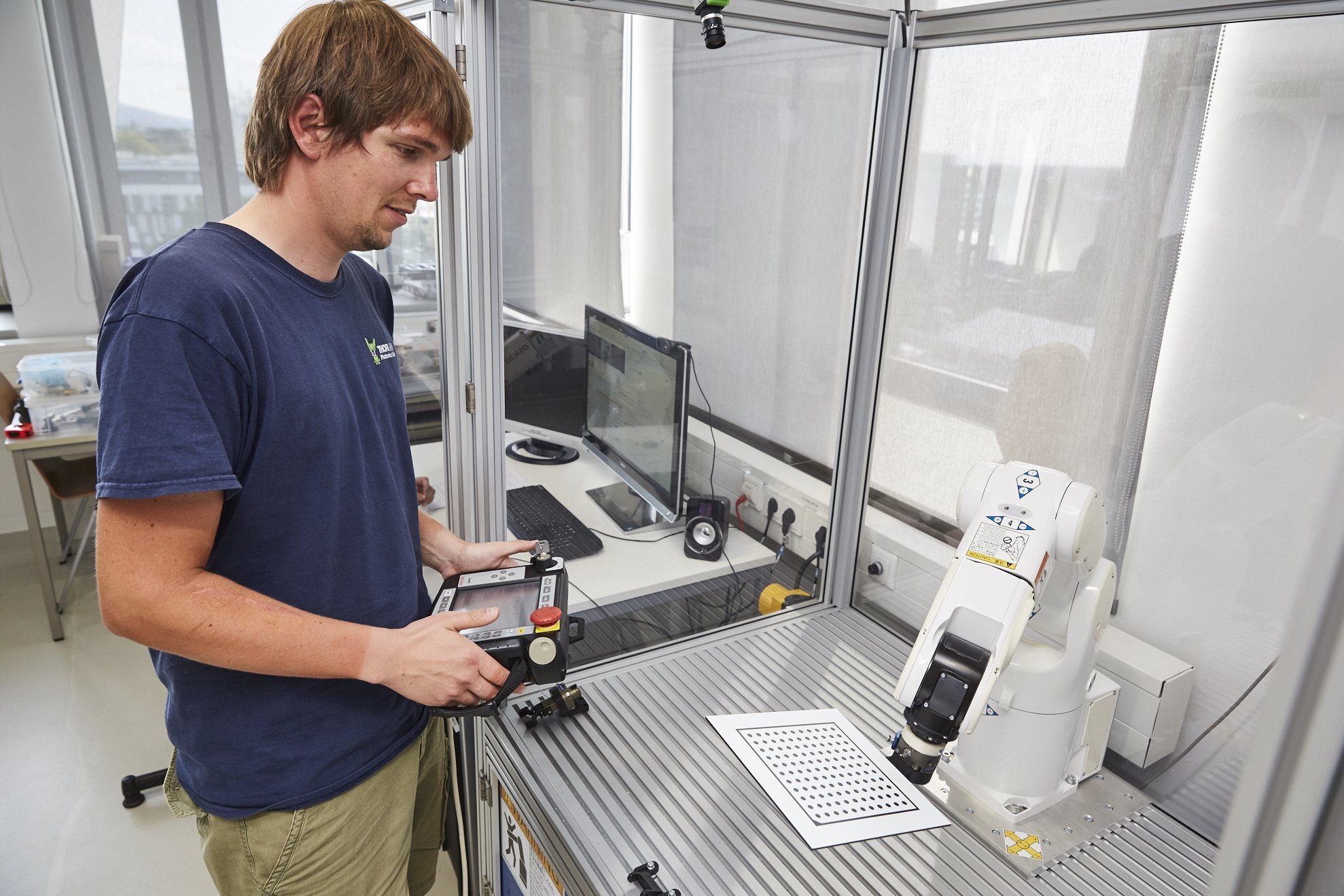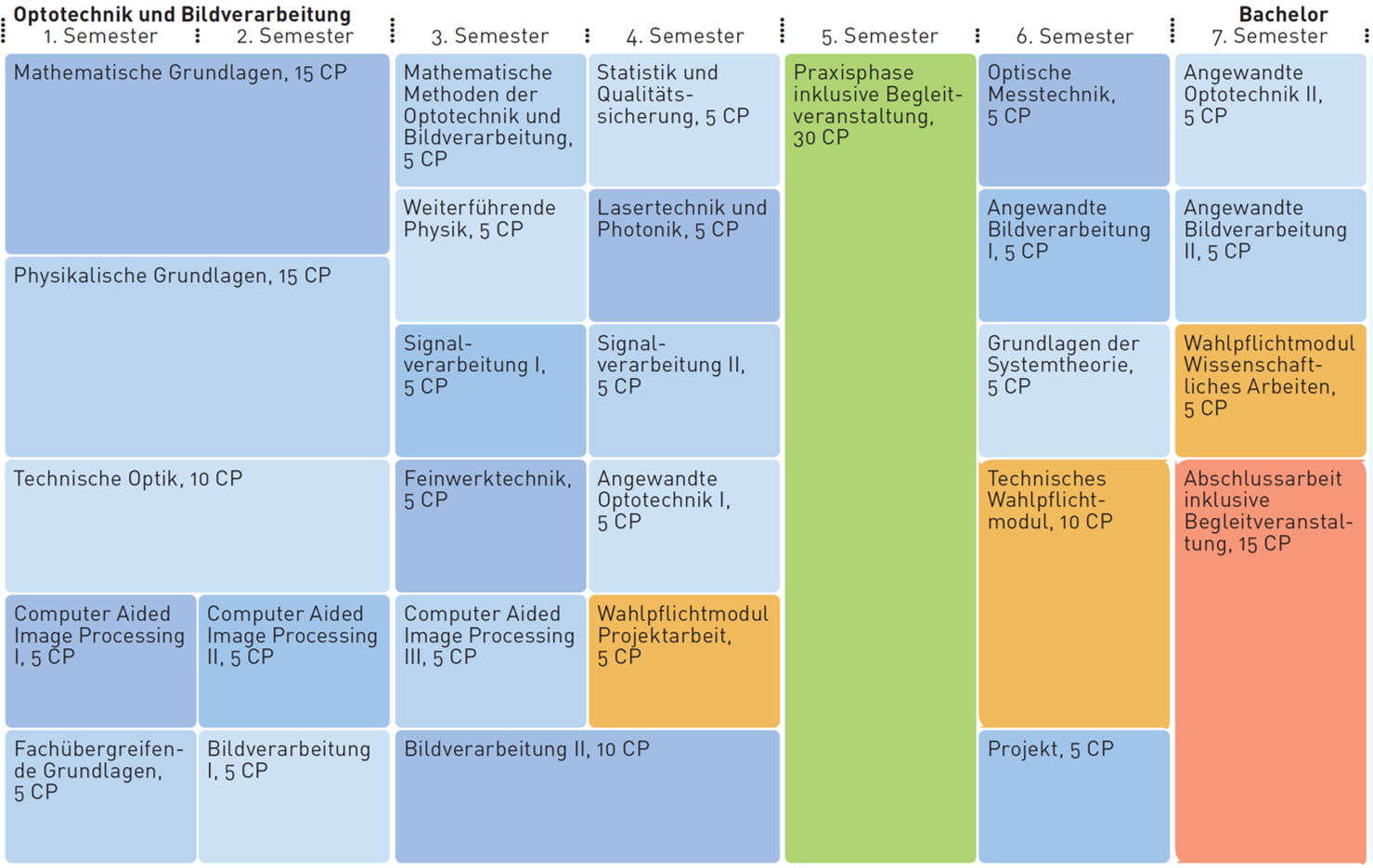Photonics and Machine Vision (Bachelor)
Understanding what you see: This is Photonics and Machine Vision (OBV)!
In our OBV Bachelor's degree program, you will acquire skills in areas such as software development and photonics to solve the technical challenges of our time:
- Improve road safety through intelligent assistance systems and autonomous driving.
- Prevent the progression of climate change with optical sensors.
- Develop new medical technologies through medical imaging and deep learning.
- Improve the sustainability of production through optimized quality control
- Help explore distant worlds with autonomous, seeing robots.
You can find more information about our focus areas on the OBV homepage.
As an engineer in optotechnology and image processing, you are a sought-after specialist in a wide variety of fields, for example:
As an application engineer for image processing, you will design systems for machine vision, such as camera systems that check the correctness of manufactured parts in production.
Your OBV degree will enable you to design such a system. You can select all the necessary components or develop them yourself. From the lighting, optics and image acquisition to programming the image evaluation.
In this way, you help to ensure the safety and quality of products. And to improve sustainability through more durable products and less waste in production.
As an expert in laser measurement technology (optical sensor technology), you will develop laser devices and systems from the first prototype to the finished series product. This could be a LIDAR for distance measurement, for example. First you analyze the customer's requirements and convert them into a product concept. You then design the optical structure, select suitable components and materials and define the interfaces to electronics, mechanics and software together in an interdisciplinary team. In each development phase, you will carry out tests and measurements in the laboratory and further develop your product concept.
Economic production in Europe is no longer possible without robotics! Robot vision systems allow robots to recognize their environment and react flexibly to it and are often the key to the successful use of robots, e.g. in the automotive industry.
As a Team Leader in Robot Vision, you will coordinate the development of innovative image processing systems and lead a highly qualified team to success. You will oversee the work of your team, ensure that all project goals are achieved and ensure compliance with the highest quality standards. You will work closely with other departments to ensure that the technology is seamlessly integrated into existing processes. In addition, you will promote the continuous training of your team and adapt strategies to technological advances.
Designation | Photonics and Machine Vision (OBV) |
University Degree | Bachelor of Science (B. Sc.) |
Standard period of study | 7 semesters (including practical semester) |
Start of study | Winter semester |
Internship | Internship not required |
Admission | No admission restriction, NC-free study program. Admission requirements include the following general higher education entrance qualification, subject-specific higher education entrance qualification, entrance qualification for universities of applied sciences. Information on vocational qualifications can be found at Studium ohne Abi |
Languages | Lectures are held in German. |
We build on the school curriculum of the upper school and provide a solid foundation in the basic subjects. The focus is on practical applications. Almost 50% of our courses take place in laboratories with practical exercises. This also includes the practical semester in the middle of the course, during which you can gain your first experience in an industrial company.
After 7 semesters, you will graduate with a Bachelor's degree in Photonics and Machine Vision. You can then expand your knowledge in a Master's degree course.
An initial overview of the course content can be found in the study program scheme or the information in the first semester brochure.
The course is divided into a basic phase in the first four semesters and an in-depth phase in the sixth and seventh semesters. In between is the practical phase in the form of a practical semester, which you spend in a company or institution in the field of optical technologies - where you can experience engineering practice at first hand.
The course concludes with an independent Bachelor's thesis.
Click on the module plan for more information.
The scheme of the study programm provides an initial overview of the content of the study program. The study program is divided into a phase of teaching the basics in the first four semesters and a phase of in-depth study in the sixth and seventh semesters. In between, there is the practical phase in the form of a work experience semester, which our students spend in a company or institution from the field of optical technologies - there you can experience engineering practice at first hand. The program concludes with an independent bachelor's thesis.
Examination regulations 2020
- Examination regulations PO 2020 Bachelor Photonics and Machine Vision (OBV):
This document also contains the following appendices: study program, elective catalogs, laboratory regulations, practical regulations. - Module manual PO 2020 Bachelor Photonics and Machine Vision
The official documents are published in the Hochschulanzeiger 2022.
Examination regulations 2013 (expiring)
- Study program PO 2013 Bachelor Photonics and Machine Vision (OBV)
- Examination regulations PO 2013 Bachelor Photonics and Machine Vision (OBV): This document also contains the following appendices: study program, elective catalogs, laboratory regulations, practical regulations.
- Module manual PO 2013 Bachelor Photonis and Machine Vision (version 2017 with FV27 extended version)
The official documents are published in the Hochschulanzeiger 2014 (BBPO) and in the Hochschulanzeiger 2015 (Modul manual).
The first point of contact for most questions about studying is the Student Service Center, or SSC for short. In addition to general student counseling and information on the details of the application process, advice on the organization or financing of studies is also available here. Student Service Center (SSC)
Students of the bachelor's degree program in Photonics and Machine Vision can change to the dual study model dual study model Photonics and Machine Vision until the beginning of the third semester.
Once you have started your studies, these are probably the most important pages:
The link my.h-da (is also stored under Quicklinks) takes you to the university information system for students. Here you can
- print out all the certificates you need yourself (study certificates, Bafög certificate and the receipt for the fees you have paid).
- view information about your exams and grades
- register for or deregister from exams.
- register for courses.
- view your course schedule and the course catalog.
- compile your individual timetable.
At www.h-da.de/tutorials you will find brief instructions for registering for exams, viewing grades, and much more.
Semester dates: Here you can find the dates for exams and events for all courses of study. This page can also be accessed directly via quicklinks.
Timetables: This page contains the links to the PDFs with the current timetables for all degree programs.
If you change degree course, you may be able to have the introductory modules you have passed in math, physics, computer science and optics recognized. This allows you to be placed in a higher semester. The Chairman of the Examination Board is responsible for the recognition of credits in the Bachelor of Optical Engineering and Image Processing degree program Prof. Ralf Blendwoske
You can find further information under:




